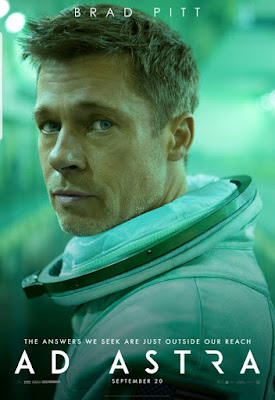In recent years we've had some doozies of awesome films set in or about space, and grounded in reality (sorry Oblivion) that tackle a variety of scale and themes. Gravity , The Martian, and Arrival come immediately to mind as ones that have challenged my thinking and stuck with me throughout the years. Arrival in particular. Even 2001, something I Retro Reviewed a few years back, sticks with you even if you don't completely grasp its ending (guilty as charged on that one...)
Recently, I watched Interstellar for the first time in a year or more and it, once again, moved me profoundly. For me it's the gold standard in a film that makes you think so big about space and where we are in time and human history that it crushes me every time at the weight of our sheer insignificance. Not only is it a fantastic film with a lot of shockingly (or theoretically) accurate science - and a world class original score - it's well balanced between story telling, character development, science fiction, and [possible] reality.
I found that the first 3/4ths of Ad Astra competed with Interstellar in many of those regards and was waiting for the ending that would have me leaving the theater, picking up the pieces of my own existence. With Ad Astra that moment never really comes - or at least it didn't for me - which is likely why I feel a bit let down by it. Even with an ending I'm not fully in support of, Ad Astra should be judged as the sum of its parts and not necessarily how it sticks the landing.
And in that regard, it's a highly engaging and captivating space adventure.
 |
| "Sandra Bullock! Is that you?" |
Which is perhaps my biggest and only complaint with Ad Astra. To a certain extent it almost feels like two different films. One that builds this big scientific mystery out in deep space, and then an ending that's driven much more about character. It's certainly not a drastic disconnect, but I do think Ad Astra leads you to believe there will be some wild epiphany or space discovery. I'm treading on spoilery waters right now so I'll refrain from divulging a lot more but the best way I can explain my reservations with the ending is that it doesn't feel like the one the film was building toward. In this regard, perhaps that's just my personal preference and perhaps I shouldn't expect a Nolan-esque twist with every mystery/space film. But I'll let you form your own opinion on how it wraps things up.
 |
| "This hog gets 4 miles to the gallon! It's got a hemi!" |
 |
| "Boo!" |
Generally speaking, films about space, aliens, or the Great Beyond earn bonus points with me. They're often original, challenging, and just flat out cool. Ad Astra is many of those things and even better, it's a well orchestrated, directed, acted, and written film. Perhaps the ending will be just what others are looking for, but for me it's the only "issue" with an otherwise captivating film that unfolds like a great book.
CONS
- The ending feels like a let down after significant build up. Part of that is me not managing my expectations but the film also seems like it's aiming for something grand
- Pacing is definitely driving for majority of the film and slower on the last 1/4th
- An original story that is captivating from the get go. Builds its mystery very well
- A future with a lot of neat details, but one that's also grounded in reality
- Mostly awesome special effects and some thrilling action beats
- Measured and appropriate (and great) core performance from Pitt
- One of the best original scores of the year and is ever present throughout the film
Rath's Review Score | 8/10

I felt cheated. It was beautifuly made, but I could not suspend my disbelief. The only thing I really liked about the movie was the whole Tony Robbins rules aspect.
ReplyDeleteThat's fair. I felt like it was a potential classic until the ending kind of burnt out with not much to say.
Delete